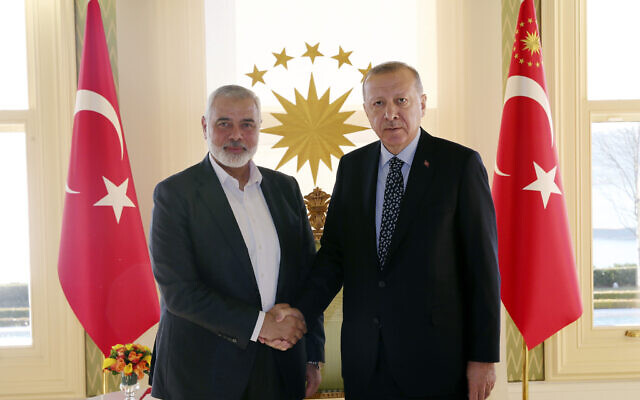GAZA CITY — A diplomatic thaw between Israel and Turkey has created challenges for the Gaza-ruling Hamas terror group, which counts on Ankara’s support, but could also offer the Islamists a more “trustworthy” middleman to deal with the Jewish state, experts say.
With Turkey’s ties to Israel all but broken for more than a decade, Turkish President Recep Tayyip Erdogan has fostered a close relationship with Hamas, which took power in the Gaza Strip in 2007.
In addition to providing financial and logistical support to the group, which is considered a terrorist organization by much of the West, Turkey is also home to senior Hamas officials, including Saleh al-Arouri, a long-standing Istanbul resident. Hamas leader Ismail Haniyeh and former chief Khaled Mashaal also visit Turkey often.
Erdogan is a vocal supporter of the Palestinian cause and a fierce critic of Israel — but he altered his regional strategy earlier this year by initiating outreach to Israel.
Ties between the two countries had collapsed in 2010 following the death of 10 civilians in an Israeli raid on the Turkish Mavi Marmara ship, part of a flotilla trying to breach a blockade to carry aid into Gaza. Jerusalem says those on board sought to assault the boarding soldiers and refused to surrender peacefully.
But Erdogan took a step toward reconciliation by calling President Isaac Herzog following his inauguration in July.
President Isaac Herzog (left) and Turkish President Recep Tayyip Erdoğan at the presidential complex in Ankara on March 9, 2022. (Haim Zach/GPO)
He then hosted Herzog in Ankara last week, the first trip by an Israeli head of state to Turkey since 2007, in a visit both men hailed as a turning point in bilateral relations.
‘Hamas concerned’
Experts have said that Erdogan’s move toward Israel had little to do with Palestinian affairs and that the Turkish leader was likely motivated by a desire to shore up his struggling economy through improved ties with a key regional economic power.
But Hamas will feel the effects of the rapprochement, said Mokhaimer Abu Sa’ada, a political scientist at Al-Azhar University in Gaza.
“Hamas is concerned,” he told AFP.
“Israel is expected to increase the pressure on the Turkish authorities. I expect that Hamas leaders will leave, perhaps for Beirut or Iran, because Istanbul will no longer be welcoming.”
Sources involved in the Erdogan-Herzog bilateral talks, who requested anonymity, said the presidents discussed the presence of Hamas leaders in Turkey, a longstanding Israeli grievance.

Turkey’s President Recep Tayyip Erdogan, right, shakes hands with Hamas terrorist movement chief Ismail Haniyeh, prior to their meeting in Istanbul, on February 1, 2020. (Presidential Press Service via AP, Pool)
Possible upside?
Hamas issued a condemnation of Turkey’s decision to welcome “the Zionist occupation president,” but it did not mention Turkey or Erdogan directly, a move experts saw as an attempt to safeguard essential ties with Ankara.
A senior Hamas figure told AFP that his group does not interfere in the internal politics of any country and wishes to “preserve a good and balanced relationship with all Arab and Muslim countries, and particularly with Turkey.”
Hamas “will not sacrifice its relations with Turkey” over the Israel outreach, said Naji Shourab, also a political scientist at Al-Azhar University.
He noted there may even be an upside for Hamas in Erdogan repairing ties with Israel. Hamas does not talk to Israel directly, but needs an interlocutor to deal with the Jewish state.
Egypt has played that role in recent years, notably negotiating a ceasefire between the sides to end an 11-day conflict last May.

Yahya Sinwar (right), Hamas’ political chief in Gaza, embraces General Abbas Kamel (left), Egypt’s intelligence chief, as the latter arrives for a meeting with leaders of Hamas in Gaza City, on May 31, 2021. (Mahmud Hams/AFP)
But Hamas’ ties with Egyptian President Abdel Fattah al-Sissi are undermined by perpetual mistrust. Sissi ousted Egypt’s late Islamist president and Hamas ally Mohamed Morsi in 2013.
“Turkey is a more effective and trustworthy channel to pressure Israel than Egypt is,” Shourab said.
Hossam al-Dajani, an expert in Islamist movements, told AFP that Turkey will also seek to retain its close Hamas ties because its support for the Palestinians earns Ankara credit in the Muslim world.
